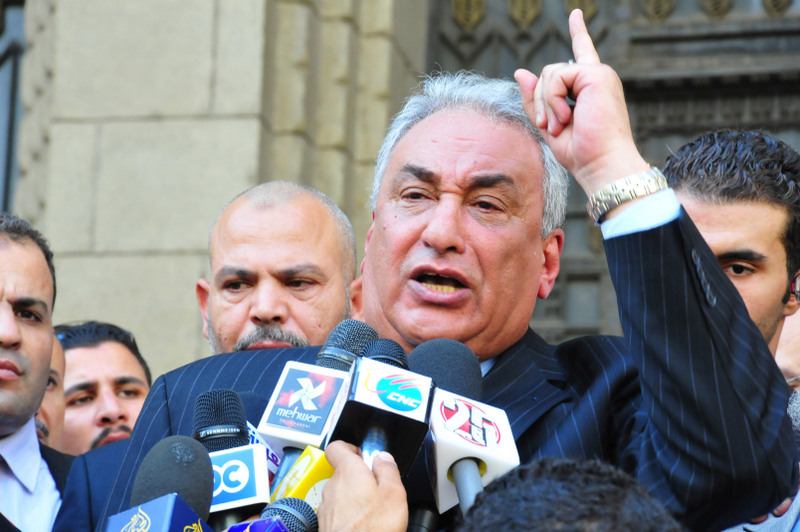Egypt is now the world’s second worst jailer of journalists – surpassed only by China. The situation is especially bad for women, who are at risk of physical and/or sexual assault in the staunchly patriarchal society.
Shahira Amin is an Egyptian journalist. As a news anchor for the state-owned Nile TV, Amin made international headlines in 2011, when she walked off the job to protest what she said was political interference in the news organization’s coverage of the pro-democracy revolution. She has also been a contributor to CNN’s “Inside Africa” program.
Now Amin helps run the Union of Media Women in Egypt, a nongovernmental organization dedicated to training and supporting female journalists. The following is a condensed version of an interview with Amin.
Deutsche Welle: What does the Union of Media Women in Egypt do?
Shahira Amin: When we started out, it was a mentoring program, but we’ve expanded, and it’s a support network for women journalists. We give them legal support, moral support and professional support. We partner with various organizations to be able to give them this support.
How many members are there?
We have 1,000 journalist members and young volunteers who come and help us with the training sessions, about 30 volunteers.
Do the members pay dues?
So far it has been free, but we’re looking for ways to sustain the organization because we don’t only do the training in Cairo. We travel to the provinces, where the journalists have very little access to training opportunities.
What kind of legal help do you provide?
Egypt is now the second biggest jailer of journalists after China. It is a difficult situation for journalists, but women have it worse. They are subjected to sexual assaults to keep them out of the public space. The attacks are systematic, and some of them are pretty bad: You can call them rapes. We can’t just provide this legal help ourselves, so we have partnered with legal organizations, and their lawyers are willing to do this for us free of charge.
Why is Egyptian society so uncomfortable with women in the role of journalists?
Because it’s a patriarchal, conservative society. I have spoken to women working as journalists outside of Cairo, and they can’t even tell their families they are working as journalists. So, when they write it is under the condition of anonymity.
The family would raise their eyebrows and say: “What, you want to stay out late? You want to talk to men? You want to travel?” This is unacceptable in the conservative community. So, a lot of women aren’t able to say “I’m a journalist.”
How difficult is it to be a journalist in Egypt – for men or women?
Under (former strongman Hosni) Mubarak, there was censorship and the state used the media as a propaganda machine for the regime. Lots of media organizations came after the revolution, but they all belong to wealthy businessmen that have links with the regime. In fact, they are more a propaganda tool than state television right now.
Are there any independent journalists in Egypt trying to get at the truth?
There are a few, but very few. But it’s the young ones leading the way now. When 17 editors of privately owned media signed a pledge of allegiance to the government saying that they would refrain from criticizing the police, the judiciary and the military – because it’s not the right time, because we are at war with terrorism – the young editors signed another pledge, saying: “This is not journalism. Sorry, we will not obey this.” There were scores of them. They are the hope for the future.
So what happened?
The young editors said: “We were taught to hold the government accountable. We will continue to practice journalism they way it should be.” I think they embarrassed the top editors. But the top editors always say, “If you are not with the state you are a traitor.” The young editors were not fired, but were harassed at work.
Is the situation worse now for journalists than under Mubarak?
I would say it’s worse because, under Mubarak, there were very, very few journalists that were jailed. Just last week there was a death sentence for two journalists. But I believe there are between 20 and 40 journalists in jail. Some have gotten a life sentence, and this is for doing their work.
Then there is the famous case of Shawkan (Mahmoud Abou Zeid), a photojournalist who was taking pictures when the police tried to disperse a pro-Morsi (deposed President Mohammed Morsi) sit-in. He’s been in jail since August 2014, in pretrial detention. That’s over two years in pretrial detention, and that’s against the constitution. He has not been formally charged – and all he was doing was his job.
You were recently honored in Germany for your work in Egypt. What was that about?
This award was the Responsible Leaders Award 2016, an annual competition organized by the BMW Foundation in Germany. I came to Berlin two months ago to present our initiatives before a jury commission, to explain what the journalist union does. And, when I got home, I got an email saying we had won the competition. So, last week I was in Munich, receiving the award with four of our board members. It’s a monetary award, but we took it together with Chile, for another initiative about waste management. So, we split the award which is $30,000 each.
What do you hope to do with the money?
It will make it easier for us to move around the country. We had to cancel a training session in Luxor because we were not able to afford the trip or the accommodation. Now we can move easier around the country in the parts where it is needed most. But also we can buy our own equipment for the practical training. Before, we had to hire cameras and studios; this will go a long way in helping our work.




